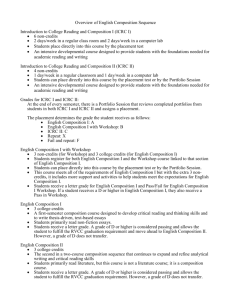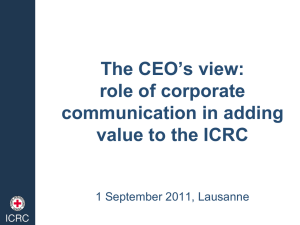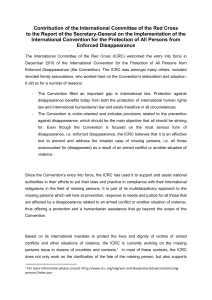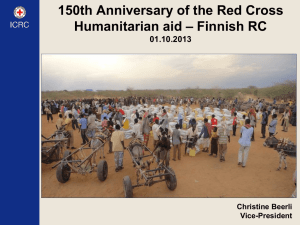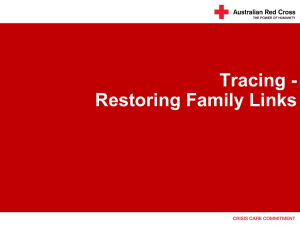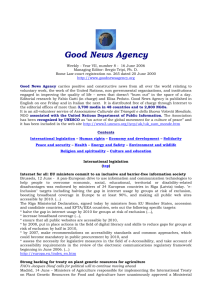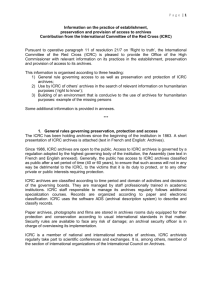ICRC_Presentation_ENG - Handicap International Seminars
advertisement
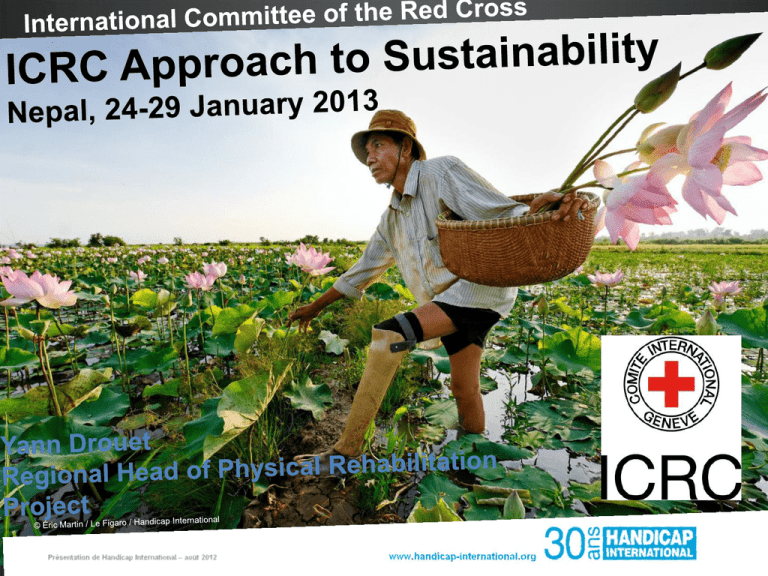
1 Promoting a long-term funcitioning of services – 1 - Introduction – 2 - Objectives of the ICRC Assistance in the area of Physical Rehabilitation – 3 - ICRC Approach – 4 - Autonomy – 5 - Conclusion – 6- Two Questions The International Committee of the Red Cross (ICRC) • The International Committee of the Red Cross (ICRC) is an impartial, neutral and independent organization whose exclusively humanitarian mission is to protect the lives and dignity of victims of war and internal violence and to provide them with assistance. • As part of its mandate, the ICRC provides physical rehabilitation assistance through its physical rehabilitation programmes (PRP) and through the Special Fund for the Disabled (SFD). 3 Objectives of the ICRC physical rehabilitation assistance • The main aims of ICRC support for physical rehabilitation activities are to increase accessibility to services, improve the quality of these services and ensure their longterm functioning 4 ICRC Approach • ICRC physical rehabilitation projects are planned and implemented in such a way as to strengthen the physical rehabilitation services offered in the country concerned, the primary aims being to improve access to services for people with disabilities, to upgrade the quality of those services and to ensure their long-term availability 5 Promoting long-term functioning of services – Ensure to implement projects with national partners – Ensure services are imbedded into a national health/social care system – Provide support to ensure services are financially, technically and managerially sustainable 6 National partners in 2013 7 Sustainability Sustainability is the ability of programmes to continue over time to meet the demands of users, providing appropriate technology, of acceptable quality, at affordable cost, in an accessible manner, enabling PWD to assert their rights, while contributing to the strength of the local health/social system, with minimal external input 8 ICRC Approach • 2 main axes: – 1. ICRC Support at service providers level – 2. ICRC Support at National level Autonomy of services • Seeks Autonomy in 3 specific areas: – Technical, – Management and administration – Financial Technical Autonomy Technical autonomy means that national partners have the capacities to provide appropriate services autonomously • ICRC Approach: – Training of professionals – Support and mentoring by expatriate expertise – Development of service provision guidelines and protocols – Availability of appropriate technology 11 Managerial Autonomy • Managerial autonomy means that national partners have the capacities to manage appropriately the services and the sector • Managerial autonomy have to be addressed differently at centre level and at national level 12 Managerial Autonomy At centre level The directorate must be able to manage appropriately all operations including: service users, service provision, stock management, human resources, financial, etc. and are able to monitor the implementation of all operations • ICRC Approach: – – – – – Training for managers Support and mentoring by external expertise Development of "Standards Working Procedures" Development of monitoring mechanisms Development and implementation of management tools 13 Managerial Autonomy At national level At national level, the authorities must be able to manage, monitor and regulate the sector. • ICRC Approach: – Development of national strategies/policies and plan of action – Training for managers – Support and mentoring by external expertise – Development of national standards – Development of monitoring mechanisms – Development and implementation of management tools 14 Financial Autonomy Financial autonomy means that funding mechanisms are in place to finance and sustain the sector • ICRC Approach: – Developing and implementing a service cost calculation system – Analyze all possible sources of funding – Advocacy 15 Challenges • Economic situation: in low-income setting, achieving progress is complicated by the broader set of complex challenges that most developing countries face • Lack of national strategies / policies and plan of action • Lack of qualified human resources at management level 16 Conclusion • Sustainability should not be seen only from the financial point of view, but must encompassed all aspects related to: – The provision of services, – The management of services provision and the sector and – The monitoring of the activities 17 Conclusion • To become long-term sustainable, rehabilitation services must not work in isolation from the national sector but must be an integrated part of this, with links to other stakeholders and referral services, and adhering to national regulations and strategies. 18 Open Questions • As availability of trained personnel (professionals and managers) is a key issue in regard of sustainability, how to retain these personnel? • How to increase the funding available for the sector? – without negatively affecting access to services for the users 19
